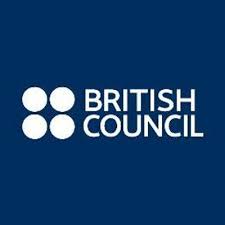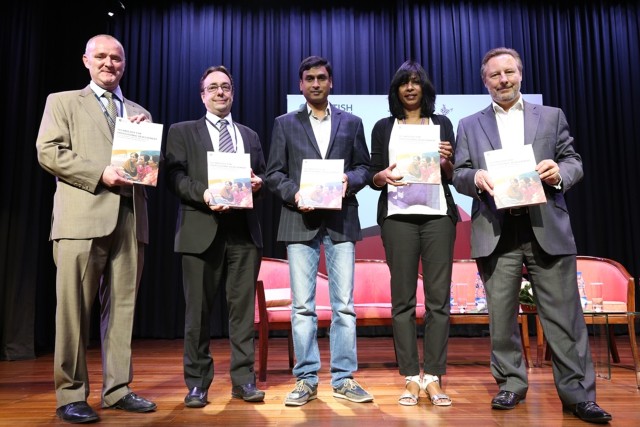 New Delhi, 6 October, 2015: The British Council in collaboration with The Open University co-hosted an event to encourage debate and discussion around the use of technology for teachers’ professional development and within the classroom.
New Delhi, 6 October, 2015: The British Council in collaboration with The Open University co-hosted an event to encourage debate and discussion around the use of technology for teachers’ professional development and within the classroom.
The Open University showcased the TESS-India project, which focuses on the development of OERs for teachers of English, maths and science. At the event, The British Council launched a report on a recent research on the access teachers across South Asia have to ICT and how we can best leverage this access to support them within their professional development. The purpose of the event was to enable an understanding of the use of technology in teacher education and the debates which surround it. The event highlighted the work of the British Council and The Open University / TESS-India in the use of technology in education (OERs, digital research and MOOCs). It also facilitated the networking of partners from academia, government and NGOs to further the understanding and use of technology in education.
The event also included a panel discussion which was chaired by Dr Tom Power – Programme Director, English in Action, The Open University, Dr Loveleen Kacker – CEO Tech Mahindra Foundation, Chris Cavey – Open Learning Manager, British Council UK, Rashmi Menon – Research Manager, Central Square Foundation and Dr Atanu Bhattacharya – Chairperson, Centre for English Studies, Central University of Gujarat.
Rob Lynes, Director, British Council, said, “The British Council is delighted to co-host debate and discussion with The Open University on use of technology for teachers’ professional development. We have always worked towards development of teachers. They are the handlers of our future, it is imperative for them to develop themselves.”
There is a global agreement on the need to provide education for all have shifted from a focus on access to an emphasis on the need for quality in order to ensure that learners are not only in classrooms, but are also experiencing teaching which will lead to successful learning. Research has shown that focusing on the development of teachers can have a significant impact on learning outcomes. It is also widely recognised that the use of digital technology can facilitate this development, from simply enabling better communication between teachers to revolutionising whole systems of teacher education.
In addition to the panel discussion, the British Council launched a report entitled Technology for professional development: access, interest and opportunity for teachers of English in South Asia. The report highlights findings from research conducted by ZingerLabs and EZVidya in 2014. This included a detailed survey of 892 teachers from six countries – Afghanistan, Bangladesh, India, Nepal, Pakistan and Sri Lanka – investigating their access, attitudes and preferences with regards to using radio, TV, mobile, computers and social media for their development. The survey was supported by a series of fourteen focus groups in seven locations and interviews with industry experts and school leaders. Additionally, the team conducted secondary research into national trends and existing initiatives which are harnessing technology for educational purposes in the South Asia region.

The key findings of the research were as follows:
- Access to digital is similar across the region and the various segments of the sample population (e.g. private vs government sector, urban, semi-urban and rural locations, etc.)
- Teachers are positive about the potential for making more use of technology for their professional development.
- Digital literacy and ICT skills are low and there is a lack of confidence in using technology.
- Computers and mobile phones are the most popular channels for professional development content, while radio and television are not preferred because of a perceived lack of interactivity.
- There are currently inadequate user payment models to support commercial development of content.
- Teachers are interested in participating in communities of practice and want resources that clearly suit their context and needs.
The report can be downloaded for free from: http://www.britishcouncil.in/continuing-professional-development
About The Open University and the TESS-India project
The Open University (OU) was founded in the UK in 1969 to open up higher education to all, regardless of circumstances or location. The Open University defines its mission as “open to people, places, methods and ideas”. It promotes educational opportunity and social justice by providing high-quality university education to all who wish to realise their ambitions and fulfil their potential. Through academic research, pedagogic innovation and collaborative partnership it seeks to be a world leader in the design, content and delivery of supported open and distance learning.
TESS-India (Teacher Education through School-based Support in India) is led by The Open University and funded by UK aid from the UK government. It is working alongside the Indian government to use Open Educational Resources (OER) to achieve transformational change for teacher educators and teachers working in elementary and lower secondary schools. The TESS-India OER support the movement of national policy into practice in classroom teaching and learning. They comprise text and video materials in multiple languages to meet a range of professional needs and contexts of use. The TESS-India OER can be integrated into formal and informal pre-service and in-service teacher education programmes to support locally identified teacher development needs.
About the British Council
The British Council is the UK’s international organisation for cultural relations and educational opportunities. We create international opportunities for the people of the UK and other countries and build trust between them worldwide. The British Council was established in India in 1948. The British Council is recognised across India for its network of 9 libraries and cultural centres. We offer a range of specialised projects in arts, education, exams, English language and society to audiences across India and more than 100,000 members. We also provide access to English language training and learning for both students and teachers, offer UK qualifications in India and enable opportunities to study in the UK.
For information on our work in India, please visit www.britishcouncil.in
